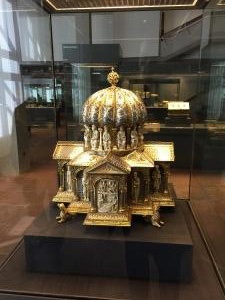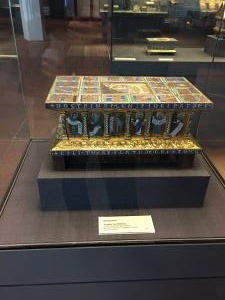Works returned by Monuments Men to Bavaria for restitution to victims instead sold to Nazis’ families
Journalists Catrin Lorch Jörg Häntzschel published this weekend an explosive revelation in Sueddeutsche Zeitung entitled “the Munich Looted Art Bazaar,” reporting on the work of the Commission for Looted Art in Europe (CLAE): the government of Bavaria sold artworks returned to it after World War II by the famed Monuments Men that were supposed to be restituted to the victims of Nazi looting. Not only was the art given back to the German state on the explicit condition that it be restituted to the victims of Nazi art plunder, in some cases it was literally returned to the families of Nazi officials, such as Emmy Goering (Hermann’s daughter) and Henriette von Schirach rather than to the victims themselves. Less than a month after the Federal Republic of Germany’s toxic and revisionist reply brief in the Welfenschatz case (which argued, among other things, that individual claimants cannot sue because the U.S. policy was this national level restitution), the ramifications are far reaching for Germany’s self-professed adherence to the Washington Conference Principles on Nazi Looted Art of 1998. While the specific artwork in question may be less significant than most of the works found in Cornelius Gurlitt’s apartment four years ago, the revelation is in many ways much, much worse. The CLAE scholarship that lead to this schocking development cannot be praised enough.
Read More
Topics:
Monuments Men,
Nazi-looted art,
Munich,
Gurlitt,
NS Raubkunst,
Restitution,
World War II
The Senate Judiciary Committee held a hearing this week (video available here) on the Holocaust Art Recovery Act (the “HEAR Act”) that drew welcome attention to the ongoing challenges to the restitution of Nazi-looted art. We were skeptical about the bill’s chances for passage when it was proposed for largely structural reasons: it is the summer before a Presidential election, which is a time when things rarely get done in Washington. Yet it is undeniable that with its bipartisan sponsors Richard Blumenthal, Charles Schumer, Ted Cruz, and John Cornyn—strange political bedfellows under any circumstance—the hearing was an open and constructive discussion that showcased real momentum towards passage. Senator Chuck Grassley’s expediting of the hearing is also a sign that there may be a vote soon. This is important, because recent bills to amend the FSIA as to looted art claims, for example, have never even had a hearing in the Judiciary Committee, let alone gotten a vote (they did pass the House first). Yesterday’s hearing definitely moves the bill into a different category with regard to its prospects. The President has not made any comments on it—yet.
Read More
Topics:
Legislation,
Nazi-looted art,
Restitution,
Statute of Limitations,
Charles Schumer,
John Cornyn,
Richard Blumenthal,
Ted Cruz
We filed yesterday the opposition to the motion to dismiss my clients’ claims over the 1935 forced sale of the Guelph Treasure, or Welfenschatz. The motion was filed two months ago by defendants Germany and the Stiftung Preussischer Kulturbesitz. As we noted when Germany first moved to dismiss the complaint last fall, Germany’s arguments were revisionist and alarming in a number of troubling ways, most seriously because they tried to excuse persecution of Jews before an arbitrary date as an internal affair not subject to U.S. court jurisdiction, and because it repudiated Germany’s international commitments under the Washington Principles to address restitution claims on the merits. The abject failure of the Advisory Commission, which Germany tries to portray here as some sort of arbitration (which it is not) is also at the fore.


Read More
Topics:
Nazi-looted art,
Foreign Sovereign Immunities Act,
Advisory Commission,
Beratende Kommission,
FSIA,
NS Raubkunst,
Restitution,
World War II,
Welfenschatz,
Limbach Commission
Germany has apparently decided to postpone its ill-conceived plans to exhibit the hundreds of works of art that it still holds from the trove seized from the late Cornelius Gurlitt. This decision was announced as a date was set to hear the latest stage of the challenge brought by Gurlitt’s cousin Uta Werner to the will that Gurlitt wrote in the last weeks of his life, leaving the entire collection to the Kunstmuseum Bern. As the Gurlitt fiasco trudges through its fourth year, this move is emblematic of the too little too late approach that has characterized the entire affair.
Read More
Topics:
Schwabinger Kunstfund,
Nazi-looted art,
Gurlitt,
Restitution,
World War II,
Task Force,
Kunstmuseum Bern,
Monika Grütters,
Raubkunst

Among the many challenges that litigants over Nazi-looted art face in the United States is a lack of uniformity. Statutes of limitations vary from jurisdiction to jurisdiction, and interpretations of jurisdictional laws like the Foreign Sovereign Immunities Act differ from one Court of Appeals to another. This is particularly challenging in the context of the Washington Conference on Nazi Looted Art of 1998 because private disputes are where the issue has meaning in the United States. There is no national commission to address potentially looted art in public possession like those in Austria, Germany, or the Netherlands (however well or poorly some of those commissions perform) because there is very little art in national ownership about which the federal government has any power to decide. Thus, in assessing U.S. compliance with the Washington Principles, it is often left to private litigants to argue about what the Principles mean in individual disputes. Happily, appellate courts have begun to reject consistently the denialist defenses of foreign countries that wish to keep stolen art just because they say so, holding that the Washington Principles support the ability of heirs to pursue claims. Yet the uneven landscape is still daunting.
A new bill introduced this week would address that, though its chances of passage into law in a contentious election season are hard to be optimistic about.
Read More
Topics:
Legislation,
Nazi-looted art,
Restitution,
World War II,
Charles Schumer,
John Cornyn,
Holocaust Expropriated Art Recovery Act,
Richard Blumenthal,
HEAR Act,
Ted Cruz
Expropriation Exception Saves Case, But District Court Holds Commercial Activity Exception Does Not Apply, Claims to Two of the Paintings at Issue are Dismissed as Well
The ongoing litigation between the heirs of Baron Mor Lipot Herzog and several state owned Hungarian museums has produced a new decision interpreting the scope of the Foreign Sovereign Immunities Act (FSIA), a frequent tool used to seek jurisdiction over Nazi-looted art claims brought in U.S. federal court. Relying on Supreme Court and D.C. Circuit cases in the last few months, the U.S. District Court held that claims for all but two of the paintings at issue can proceed under the FSIA’s “expropriation exception” codified in 28 U.S.C. § 1605(a)(3), but that the FSIA’s “commercial activity exception”—which the D.C. Circuit had held applicable in 2013 to the same case—could not be invoked based on the facts in the record developed in discovery. De Csepel v. Republic of Hungary, 2016 U.S. Dist. LEXIS 32111 (March 14, 2016).
Read More
Topics:
David de Csepel,
commercial activity exception,
Hungary,
Foreign Sovereign Immunities Act,
Budapest University of Technology and Economics,
Hungarian National Gallery,
Budapest Museum of Fine Arts,
expropriation exception”,
Restitution,
World War II
Barely a week ago German Minister of Culture Monika Grütters was dismissively rejecting any changes to the Advisory Commission that issues recommendations on claims of Nazi-looted art in German museums. Today, in a classic Friday afternoon news dump, Germany caved to a drumbeat of pressure to include Jewish members of the Commission, pressure that began right here and continued with the support of colleagues and friends around the world. The lesson? No voice is too small to make a difference.
Read More
Topics:
Germany,
Nazi-looted art,
Restitution,
World War II,
Monika Grütters,
Raubkunst,
Limbach Commission
Last week Germany’s Minister of Culture Monika Grütters made the astonishing statement that the Advisory Commission that issues recommendations for questions of allegedly Nazi-looted art in German museums would not be revised to include a member of the Jewish community because that Jewish member “would be the only voice who would be prejudiced.” The statement was not idle gossip, it was to the New York Times, which was writing a feature piece about her. This was a shockingly tone-deaf statement for a German cabinet member to make. Even in a vacuum, it is logically indefensible; why would a Jewish member be more biased than a German member (about which she had no objection). And, of course, it is not a vacuum—we are talking about Germany.
Read More
Topics:
Germany,
Nazi-looted art,
Gurlitt Collection,
Advisory Commission,
Restitution,
Monika Grütters,
Raubkunst,
Limbach Commission
Two days after suspending their participation in the Advisory Commission on the return of cultural property seized as a result of Nazi persecution, especially Jewish property, often called the "Limbach Commission" after its presiding member Jutta Limbach (the Beratende Kommission im Zusammenhang mit der Rückgabe NS-verfolgungsbedingt entzogenen Kulturguts, insbesondere aus jüdischem Besitz), the heirs of Alfred Flechtheim withdrew from the proceedings entirely. The dispute concerns Violon et encrier (Violin and Inkwell) (1913) by Juan Gris in the Stiftung Kunstsammlung Nordrhein-Westfalen (Art Collections Foundation of North Rhine-Westphalia) in Düsseldorf.
Read More
Topics:
Alfred Flechtheim,
Nazi-looted art,
Advisory Commission,
Beratende Kommission,
Restitution,
Düsseldorf,
World War II,
Limbach Commission,
Dr. Michael Hulton,
Juan Gris





